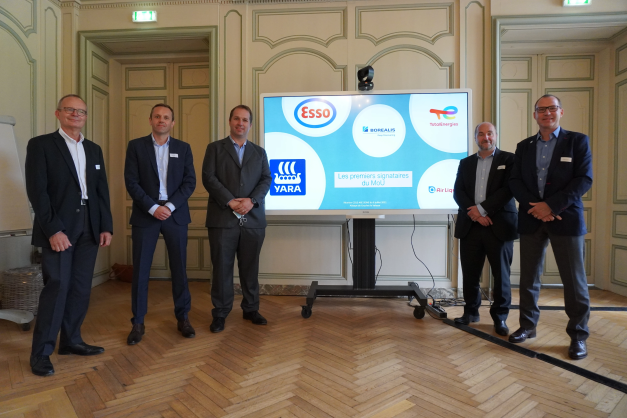Decarbonising the Normandy industrial basin
By Julian Atchison on July 14, 2021
Five partners
Air Liquide, Borealis, Esso France, TotalEnergies and Yara signed a new MoU this week to explore infrastructure options to help decarbonise the Normandy industrial basin in France. The organisations have agreed to collaborate to assess the technical and economical feasibility of implementing an industrial CO2 capture and storage (CCS) chain, from their industrial facilities in Normandy to ultimate storage in the North Sea.
Our strong interest in this project is in the first place driven by the significant GHG reduction that can be achieved. It is our responsibility to society to seek for and engage in solutions for climate challenges. At the same time the project is an innovative and collaborative approach across the leading regional industries, creating new value chains.
Leo Alders, Chief Operating Officer Borealis Fertilizer in the MoU press release, 12 July 2021
Le Havre ammonia plant
The MoU has particular significance for Yara’s Le Havre ammonia production plant. The plant has a current production capacity of 400,000 tonne ammonia per year. But, Le Havre has no immediate access to renewable electricity or green hydrogen. These two decarbonisation tools are being employed elsewhere by Yara to reduce emissions at their Sluiskil (Netherlands), Pilbara (Australia), and Porsgrunn (Norway) plants. In the near term, CCS is key to decarbonising the Le Havre ammonia facility:
This alliance will support Yara Industrial Solutions’ journey to decarbonize production units and all of our value chains. Carbon Capture and Storage is essential in achieving our mid-term ambition of a 30% reduction in absolute CO2 emissions in 2030 compared to 2018, meaning a reduction of 200,000 tons of CO2 emissions, equivalent to 100,000 tons Blue Ammonia at Le Havre production plant.
Jorge Noval, President, Yara Industrial Solutions in the MoU press release, 12 July 2021
